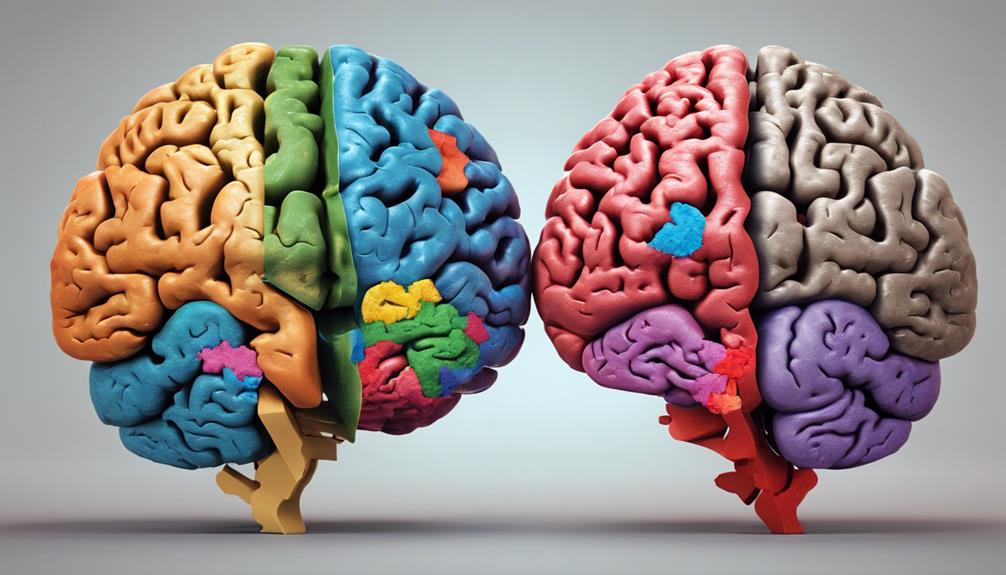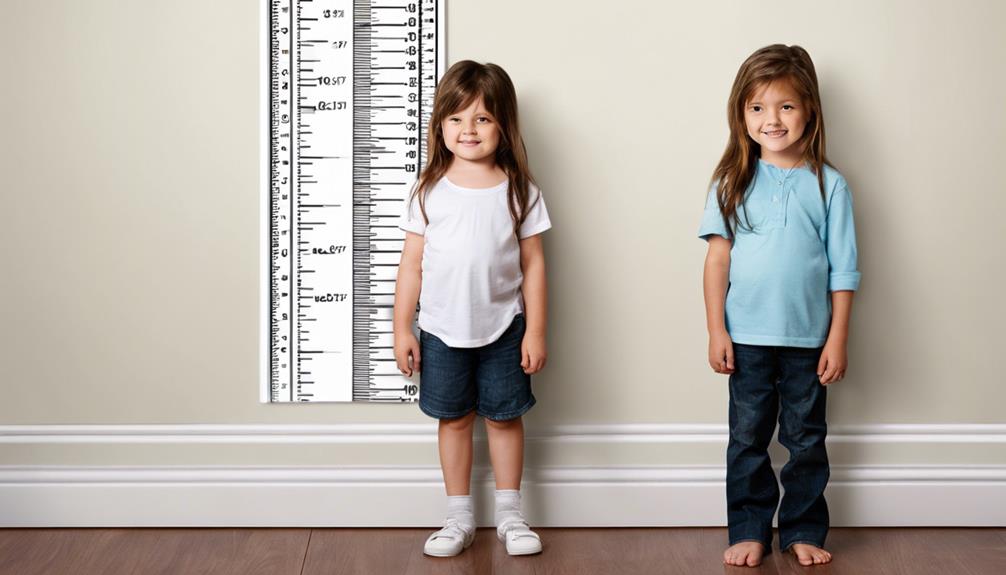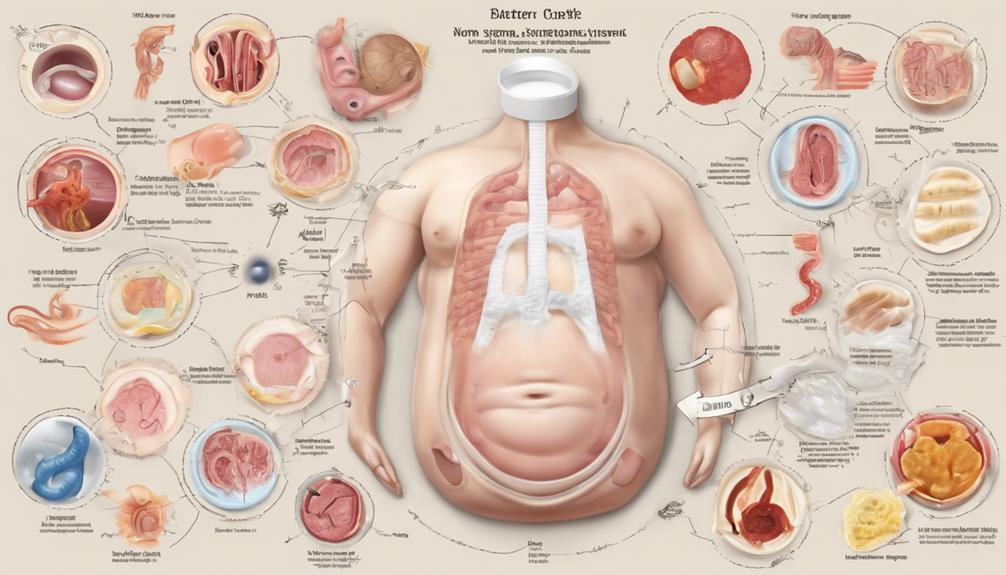As we explore the key domains of development in psychology, it becomes evident that each area plays an important role in shaping individuals throughout their lives.
From observing a child's physical milestones to understanding the complexities of their cognitive abilities, these domains offer a detailed view of human growth.
However, what remains intriguing is how these domains interact and influence one another, contributing to the detailed nature of development.
By delving deeper into each of these areas, we can uncover the intricate processes that mold individuals into who they are today.
Key Takeaways
- Physical development involves fine and gross motor skills, supported by age-appropriate activities and nutrition.
- Cognitive development progresses through stages like sensorimotor and formal operational, tailored activities aiding growth.
- Social and emotional growth are intertwined, with emotional development shaping relationships and empathy.
- Language acquisition involves phonology, syntax, and semantics, progressing from babbling to complex communication skills.
Physical Development in Psychology
How does physical development in psychology influence the progression of children through key milestones in growth and motor skills?
Physical development, encompassing fine motor skills like grasping objects and gross motor skills such as walking, plays an important role in a child's overall growth and changes. As children engage in sensory and motor activities, they develop essential abilities like eating with utensils and balancing while moving. Parents can support this development by providing age-appropriate activities that challenge and enhance these skills, alongside ensuring a diet rich in healthy nutrition to fuel their growth.
Physical development in children follows a directional pattern, with milestones like sitting up, crawling, and walking marking their progress. Understanding these stages helps caregivers create environments that promote and support the natural development of children as they navigate through these various physical milestones. By actively engaging with children and providing opportunities for movement and exploration, caregivers can facilitate the enhancement of both fine and gross motor skills, laying a foundation for healthy physical development.
Cognitive Development Stages

Cognitive development stages progress through distinct phases of advancement in thinking, problem-solving, and understanding of the world. Jean Piaget's renowned theory outlines these stages as sensorimotor, preoperational, concrete operational, and formal operational. Each stage represents a set of developmental milestones that children typically achieve as they grow.
Moving from the concrete operational stage to the formal operational stage, there's a notable shift towards more complex cognitive skills, such as abstract thinking and hypothetical reasoning. Understanding these stages is essential for creating age-appropriate learning activities that support children's cognitive growth.
During the concrete operational stage, which typically occurs between ages 7 to 11, children become more proficient at problem-solving and logical thinking. As they progress into the formal operational stage around age 12 and beyond, they further develop their cognitive abilities, enhancing their capacity for critical thinking and understanding of abstract concepts.
Supporting children through these stages with engaging cognitive activities fosters their intellectual growth, creativity, and memory development. By tailoring learning experiences to match the cognitive skills of each developmental stage, we can optimize children's cognitive development and prepare them for future academic pursuits.
Social and Emotional Growth

Moving from the domain of cognitive development to social and emotional growth, we explore the intricate landscape of understanding and managing emotions, forming relationships, and fostering empathy. Emotional development plays a pivotal role in shaping a child's social interactions. The ability to recognize and express emotions appropriately is fundamental for healthy social development. Additionally, nurturing adults play an important role in guiding children through the complexities of their emotions, fostering a secure base for emotional growth. It's essential to understand that emotional and cognitive development are deeply intertwined, influencing one another greatly.
Building positive relationships with peers and adults is important for fostering empathy and emotional intelligence. Teaching children about self-identity, emotions, and strategies for handling peer pressure equips them with essential skills for maneuvering the social world. By providing children with a supportive environment that encourages the exploration and expression of emotions, we pave the way for robust social and emotional development.
Language Acquisition in Development

Exploring the intricate process of language acquisition in developmental psychology reveals the foundational components essential for acquiring verbal communication skills. Language acquisition encompasses various aspects such as phonology, pragmatics, semantics, and syntax, all essential in the development of language abilities. The brain plays a significant role in language acquisition, with Broca's area responsible for speech production and Wernicke's area crucial for language comprehension. Understanding language development involves recognizing that children initially grasp language receptively before mastering expressive communication, underscoring the importance of receptive language skills in the learning process.
Additionally, language development rates can vary among children due to factors like exposure to language-rich environments and individual learning preferences. The stages of language development typically progress from babbling and single-word usage to forming complex sentences and engaging in abstract language construction. This progression illustrates the gradual acquisition of linguistic skills and the intricate journey individuals undertake in mastering language abilities.
Factors Influencing Human Development

Understanding the intricate interplay between genetics, environment, and prenatal care is essential in comprehending the major factors that influence human development. Genetics lay the groundwork for various aspects of development, influencing traits like intelligence or temperament. Environmental factors, such as family dynamics or socioeconomic status, also shape an individual's growth. Prenatal care plays a critical role in ensuring a healthy start to life, impacting both physical and cognitive development.
When considering development, speech delays are a common concern. Speech therapy interventions can effectively address these delays, aiding in language acquisition. Consulting a pediatrician for guidance on developmental milestones is advisable, as early identification and intervention are key in managing delays. It's crucial to recognize individual differences in reaching these milestones; each person progresses uniquely. By acknowledging these factors and seeking appropriate support, individuals can navigate developmental challenges effectively.
Frequently Asked Questions
What Are the Domains of Development in Psychology?
We learn about the key domains of development in psychology. We explore physical, cognitive, social-emotional, and language development. Each domain influences a child's growth and well-being. Understanding and nurturing progress in these areas are essential for healthy development.
What Are the 5 Domains of Development?
The 5 domains of development encompass physical, cognitive, social-emotional, language, and motor skills. Understanding these facets aids in identifying delays early. Monitoring milestones guides interventions, supporting inclusive growth. This integrated approach fosters all-encompassing development.
What Are the Three 3 Domains of Development Explain Each?
Exploring the three key domains of development – physical, cognitive, and social-emotional – exposes the intricate tapestry of human growth. Each domain, from refining motor skills to understanding emotions, shapes our journey towards maturity.
What Are the 5 Main Areas of Child Development?
In child development, the five main areas are physical, cognitive, social-emotional, language, and mental health. These domains are interconnected and essential for a child's holistic growth and well-being, shaping their future capabilities and relationships.
Conclusion
To conclude, the key domains of development in psychology – physical, cognitive, social-emotional, and language areas – are intricately intertwined, forming the foundation of a child's growth and well-being.
As the saying goes, 'a chain is only as strong as its weakest link,' highlighting the importance of addressing and nurturing all aspects of development to guarantee favorable outcomes for individuals.
Understanding and supporting these domains is essential for promoting healthy development and addressing any challenges that may arise.









